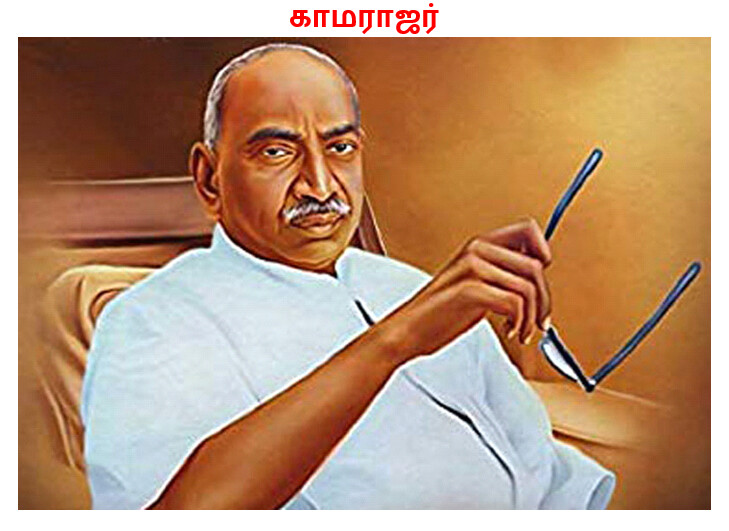K. Kamaraj
HISTORY

K. Kamaraj, whose full name was Kumaraswami Kamaraj, was a prominent Indian politician and a key figure in the history of Tamil Nadu and Indian politics. He was born on July 15, 1903, in a small village called Virudhunagar in Tamil Nadu, India, and he passed away on October 2, 1975. Kamaraj is often referred to as the “Kingmaker” for his significant influence on Indian politics, particularly within the Indian National Congress (INC) party.
Overview of the history and contributions of K. Kamaraj:
Early Life and Education: Kamaraj was born into a humble family, and his formal education was limited.
Entry into Politics: Kamaraj’s involvement in politics began at a local level when he joined the Congress party in the 1920s.
Rise within the INC: Kamaraj gained prominence within the INC for his organizational skills and dedication to the party’s cause. He played a crucial role in the Madras Provincial Congress Committee.
Chief Minister of Tamil Nadu: In 1954, Kamaraj became the Chief Minister of Tamil Nadu (then called Madras State) after the death of C. Rajagopalachari. He served as Chief Minister for three consecutive terms, from 1954 to 1963.
Educational Reforms: One of Kamaraj’s most significant contributions was in the field of education. He initiated a series of educational reforms, known as the “Kamaraj Plan,” which aimed to improve access to education and reduce dropout rates among school children. This plan was widely praised and emulated across India.
Political Impact: Kamaraj was instrumental in helping the INC win a substantial number of seats in the 1957 general elections. His political acumen and ability to mobilize the masses earned him a reputation as a shrewd strategist.
Support to Lal Bahadur Shastri: During the 1960s, Kamaraj played a crucial role in the elevation of Lal Bahadur Shastri as the Prime Minister of India after the sudden death of Jawaharlal Nehru in 1964.
Kamaraj Plan and “The Syndicate”: Kamaraj proposed a plan in 1963, known as the “Kamaraj Plan,” which aimed to rejuvenate the INC by encouraging senior leaders to resign from ministerial positions and work for the party at the grassroots level. This move helped in revitalizing the party and nurturing new leadership. His group of supporters within the party came to be known as “The Syndicate.”
Later Life: After stepping down as Chief Minister in 1963, Kamaraj continued to be active in politics. He served as the President of the INC from 1964 to 1967.
Legacy: K. Kamaraj is remembered as a leader who championed education, grassroots politics, and the empowerment of ordinary people. His contribution to the Indian political landscape, especially within the INC, remains significant.
Today Breaking News
Virat Kohli, born on November 5, 1988, in Delhi, India, is one of the greatest cricketers of all time and a former captain of the Indian cricket team. Known for his aggressive style of play, extraordinary consistency, and fitness, Kohli has broken numerous records in international cricket and remains a global icon in the sport. […]
He Born on February 5, 1985, in Funchal, Madeira, Portugal, is widely regarded as one of the greatest footballers of all time His career has been marked by a relentless drive for success, exceptional athleticism, and an extraordinary ability to score goals. Here’s a detailed history of his life and football career: Early Life and […]
The earthquake struck at 4.33 am today. An earthquake struck Leh in Ladakh this morning. The National Seismological Center reported that the magnitude of the earthquake was 4.5 on the Richter scale, which occurred at 4.33 am. The earthquake was centered at a depth of 5 km in Levee. Although buildings were slightly shaken due […]


